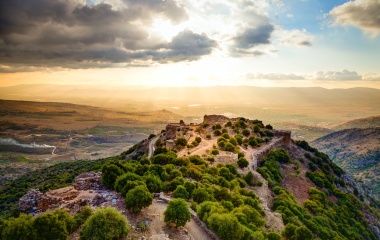
“Moshe said to the Lord, "I beseech You, O Lord. Lo ish devarim anochi, I am not a man of words, neither from yesterday nor from the day before yesterday, nor from the time You have spoken to Your servant, for I am heavy of mouth and heavy of tongue” (Shemot 4:10).
So claimed Moshe in trying to reject the mission G-d had set for him at the burning bush. Apparently, much had changed over the ensuing 40 years. “Eilu Hadevarim, these are the words that Moshe addressed to all Israel on the other side of the Jordan through the wilderness, in the Arabah near Suph, between Paran and Tophel, Laban, Hazeroth, and Di-zahab” (Devarim 1:1).
Apparently, Moshe had become a great speaker. So much so he addressed the people throughout the years in the wilderness in so many different places[1]. Moshe spends the last five weeks of his life speaking to the Jewish people. His words are so appropriate, beautiful and inspiring – indicating his great oratorical skills. The phrase “and G-d spoke to Moshe, to say” which appears over 150 times in the three prior books of the chumash - indicating a Divine speechwriter – is nowhere to be found in sefer Devarim – not even once. So much so that the Abarbanel wonders whether sefer Devarim, unlike the rest of the Torah where G-d dictated the words, reflects the words of Moshe himself with no Divine help – words that G-d later approved to be included in the Torah. While the Abarbanel, after a long back and forth, rejects this view, the fact that he entertains the notion is striking, not just theologically – flying in the face of the Rambam who would declare a view that ascribes even one word of the Torah to human authorship as heretical – but literarily. Moshe’s words are so uplifting that one cannot tell if they reflect the words of G-d or the words of man.
Moshe’s claim that he was not an ish devarim was the last argument Moshe used at the burning bush, likely indicating it was his weakest. And for good reason. It is hard to know what exactly Moshe meant when he claimed he was not an ish devarim. His mastery of language is clear as he leads the people in song after the crossing of the sea, his eloquence clear as he defends the Jewish people after the golden calf, his persuasive ability evident as he pleads for the people after the chet hameraglim. Even his debate with G-d indicates his great competence with words.
Perhaps we might suggest that it was a mistruth[2], spoken before Moshe became Moshe Rabbeinu, the one who could not tolerate falsehood. Perhaps after being away from Egypt for so long he felt his Egyptian was a bit rusty, or perhaps it was just a case of not knowing what to say to Pharaoh, hence G-d’s response “Now go, and I will be with you as you speak and will instruct you what to say” (Shemot 4:12).
And yet as we begin sefer Devarim, as great a speaker as Moshe was, we are reminded that it was the devarim, the words, of Moshe that were his downfall. He was told to speak to the rock, yet instead of being an ish devarim, he hit it instead. And when he did speak, it was with anger that he began “shimo nah hamorim, listen now you rebels”.
Moshe’s words in sefer Devarim are those necessary to prepare the people to enter the Land of Israel. How ironic that due to his misspoken words, Moshe would not be able to follow his own words as the people were about to enter the Land.
Our Torah reading is arranged in such a fashion that sefer Devarim is always begun the week leading up to Tisha B’Av. So much of the suffering of the Jewish people, and all peoples, is due to the misuse of speech. Denigrating others, calling political opponents enemies, using speech to divide instead of to unite the people leads to destruction. They are prime examples of sin’nat chinam. At the same time one must know when it is silence that can be fatal. The inability or unwillingness of the Sages to speak up as bar-Kamtza was publicly humiliated set in motion a series of events that “destroyed our Temple, burned our Sanctuary, and exiled us from our Land” (Gittin 56a).
Knowing when – and how – to speak can make all the difference between greatness and failure. We must all strive to become an ish, or isha, devarim. Moreover, we must insist – and elect – only those leaders who share that goal. Our future depends upon it.
[1] Rashi posits that the list of the above-mentioned places was not geographic, but an allusion to the many places where the Jews sinned in the desert. So as not to embarrass the people, Moshe makes only an oblique reference to these sins, indicating great psychological insight – and oratorical skill. While the Rashbam does see this long list as a way to pinpoint the exact location, I have explained the verse to be a reference to many of the places where Moshe spoke to the people.
[2] See the commentary of the Tiferet Yisrael (Mishna Kiddushin 4:14) where he quotes a “legend” that Moshe himself noted that as a youth he had many very negative traits – including anger, arrogance, and all faults of man – and worked very hard to overcome them, something he did not have 100% success with.



